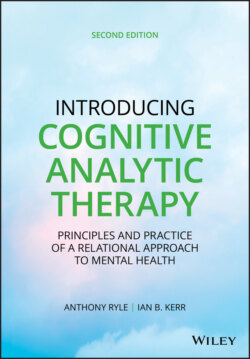Читать книгу Introducing Cognitive Analytic Therapy - Anthony Ryle - Страница 61
Our Evolutionary Past
ОглавлениеNatural selection apparently favored individuals who were biologically endowed with the potential to be socially formed and responsive and who were therefore capable of living in groups and able to adjust flexibly to a wide variety of physical circumstances and social structures. There is an increasingly large, although at times rather contradictory and acrimonious, literature on the acknowledged effects of our evolutionary inheritance on our mental functions, making sense of which is still challenging (Barrett & Dunbar, 2007; Buss, 2005; Donald, 1991; Evans & Zarate, 1999; Gilbert, 1992; McGuire & Troisi, 1998; Nesse, 2005; Plotkin, 1997; Rose & Rose, 2000; Slavin & Kriegman, 1992; Stevens & Price, 1996; Tooby & Cosmides, 1992). Since we are, in evolutionary terms, simply another product of that process, it is accepted increasingly that we carry within us certain evolutionarily more “primitive” although originally adaptive predispositions to behave in certain ways at certain times and in certain circumstances. However, unlike “lower” order species whose activities may be determined almost exclusively by stimulus‐evoked, “all or nothing,” instinctual patterns, our species is characterized by a remarkable capacity, consequent to the development of our expanded frontal cerebral cortex (Innocenti & Kaas, 1995), to reflect upon and modify such patterns and to be influenced by socio‐cultural formation and context. In addition, our evolutionary development has given us the potential to acquire a capacity for intersubjectivity and an extraordinary ability, acquired through the process of socially meaningful, joint, and reciprocal interactions, to “read” or “be in” the minds of others. It has been suggested that this ability enabled our ancestors to exist effectively and advantageously in large groups, which have, for some time, been our “Environment of Evolutionary Adaptedness” (see Evans and Zarate; Buss, 2005; Dunbar and Barrett, 2007). It is suggested that the ability to understand each other's minds and motives has been and continues to be of critical importance for our species and is reflected in our preoccupation with social intercourse and communication—including our predilection for gossip! More seriously, this also implies that whatever meaning or fulfillment there is in our lives is fundamentally social, an understanding, in our view, with important implications for both psychotherapy and politics. Most evolutionary psychologists, however, in common with even more recent psychodynamic theorists, propose an understanding of mind and self that is characterized by a cognitive, or at best an intersubjective, monadism. In this formulation, interpersonal experience is seen as “mapped” or “represented” within fundamentally individual, pre‐existing mental structures. Curiously, this very Western view of the self would almost certainly be incomprehensible to most members of traditional or “primitive” societies. In this respect, the CAT model may well have something important to contribute to a dialog with evolutionary psychology.
These various features of our evolutionary inheritance, in particular our capacity to be shaped by developmental experience and the internalization of social meanings and cultural values, have largely contributed to the historic conceptual conflict between the protagonists of the effects of “nature” and “nurture” or of genes versus environment. This “for or against” argument should, by now, be essentially redundant. As Plomin (1994) has remarked, the “nature–nurture” debate is centered nowadays around the hyphen and around its developmental, synthetic interactions. And as we (AR) have previously noted, notwithstanding our various predispositions, “humans are above all biologically predisposed to be social formed.”
